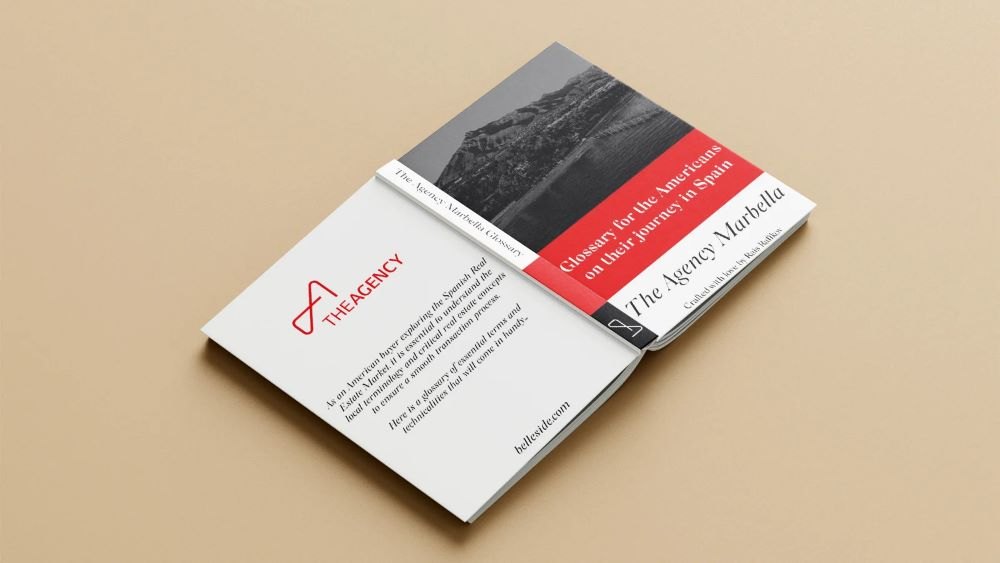
Spanish Property Buying Guide
The glossary of essential terms and technicalities.
Teba Siles | · 9 min. read
The vibrant culture, scenic landscapes, and sunny climate of Spain continue to attract U.S. buyers seeking real estate opportunities. However, navigating the Spanish property market involves understanding unique legal frameworks, local terminology, and financial considerations that differ significantly from the American system.
This Spanish property buying guide for U.S. buyers is designed to simplify the process. It highlights key terms and concepts while emphasizing the value of working with experienced real estate professionals. With the right preparation and support, purchasing your dream property in Spain can be a seamless and rewarding experience.
- Table of contents
- Why Terminology Matters
- Understanding Key Spanish Property Terms
- Property Registration and Valuation
- Taxes and Financial Aspects
- Contracts and Ownership Terms: Key Contracts to Understand
- The Role of Real Estate Professionals
- Practical Tips for U.S. Buyers
- Key Considerations for U.S. Buyers in the Spanish Property Market
- Final Thoughts: Making the Spanish Property Market Work for You
Why Terminology Matters
For U.S. buyers, learning the Spanish property buying guide which includes understanding essential Spanish property terms is crucial to avoid confusion and ensure a smooth transaction. This can also help you in navigating Spanish property law. Real estate professionals can help interpret these terms, ensuring buyers remain informed throughout the process.

Understanding Key Spanish Property Terms
Essential Terms to Know
Here are some key terms every U.S. buyer should understand before purchasing property in Spain:
- NIE (Número de Identificación de Extranjero):
- A tax identification number is required for all financial transactions in Spain, including property purchases.
- Your agent can guide you through obtaining this vital document.
- Escritura Pública:
- The deed of sale formalizes property ownership.
- Signed before a Notario, this document is essential for registering the property.
- Notario (Notary):
- A public official in Spain who ensures the legality of the transaction.
- Your agent facilitates appointments and manages document preparation.
- Hipoteca (Mortgage):
- A mortgage specifically for purchasing property in Spain, where terms may vary for non-residents.
- Banks typically require a Tasación (property valuation) before approval. Mortgage conditions can differ significantly based on the property type, the buyer's residency status, and financial profile.
- Certificado de Eficiencia Energética (CEE):
- This Energy Performance Certificate rates a property’s energy efficiency, from "A" (most efficient) to "G" (least efficient).
- Sellers are legally required to provide this certificate. Real estate agents can verify the certificate’s validity to ensure compliance and help buyers assess long-term energy costs.
- Poder (Power of Attorney):
- A legal document allowing a trusted representative to act on your behalf in legal and financial matters, such as signing contracts and managing property registration.
- Particularly useful for U.S. buyers purchasing remotely, it enables a seamless transaction process without requiring constant travel to Spain.
- Valor Catastral:
- The cadastral value assigned to a property is used for calculating taxes like the annual IBI and Plusvalía.
- Your agent can confirm the accuracy of this valuation, ensuring proper tax calculations and avoiding surprises during or after the purchase.
Property Registration and Valuation
Ensuring Legal Ownership
- Registro de la Propiedad (Land Registry):
This is the official record of property ownership. Property registration ensures legal ownership and protects your rights. - Catastro:
A registry is used for tax purposes, detailing property characteristics like location, boundaries, and cadastral value.
Understanding Valuation
- Tasación:
This is the appraisal process used to determine the property’s market value. It is often required for mortgage approval. Real estate professionals coordinate with appraisers and banks to ensure accurate valuations.
Taxes and Financial Aspects
Understanding the tax implications of buying a property in Spain is essential. Here's what U.S. buyers need to know:
- IBI (Impuesto sobre Bienes Inmuebles):
- An annual property tax based on the cadastral value.
- ITP (Impuesto de Transmisiones Patrimoniales):
- A transfer tax on resale properties. Rates vary depending on the region.
- IVA (Impuesto sobre el Valor Añadido):
- A value-added tax is applied to new properties, typically at a rate of 10%.
- AJD (Actos Jurídicos Documentados):
- A stamp duty tax on legal documents, including the deed.
- Plusvalía:
- A municipal tax is based on the increase in land value since the seller’s purchase.
- Negotiations usually determine whether the buyer or seller pays this tax.
Contracts and Ownership Terms: Key Contracts to Understand
Arras (Deposit Contract)
A preliminary agreement that secures the property and outlines sale terms. The deposit, typically 10%, is held by the agent to protect both parties.
Comunidad de Propietarios
In shared buildings or complexes, this organization manages communal areas. Members contribute fees for maintenance, which agents explain during the purchase process.

The Role of Real Estate Professionals
For U.S. buyers, the expertise of a local real estate agent is invaluable. Agents simplify property search, negotiation, and legal compliance while bridging cultural and language gaps.
Real-Life Scenarios Where Professionals Add Value
- Property Details: Agents ensure accuracy in the Catastro to prevent discrepancies.
- Tax Negotiations: Professionals often help negotiate who pays the Plusvalía tax.
- Remote Transactions: Agents handle purchases for buyers abroad using Poder (Power of Attorney), ensuring smooth operations.
Practical Tips for U.S. Buyers
Managing Mortgages and Financial Transactions
- Research banks offering competitive Hipoteca options for non-residents.
- Collaborate with your agent to ensure the Tasación aligns with the purchase price for smooth loan approval.
Verifying Property Efficiency with CEE
- Ensure the seller provides a valid Certificado de Eficiencia Energética during the buying process.
- Use the CEE rating to gauge energy costs and plan for potential upgrades if necessary.
Simplifying Transactions with Power of Attorney
- Consider granting Poder to a legal representative, particularly for managing tasks like:
- Signing the Escritura Pública (deed).
- Handling property registration with the Registro de la Propiedad.
- Paying taxes and fees on your behalf.
Understanding the Impact of Valor Catastral
- This valuation impacts several taxes, so ensure it’s up-to-date and correctly documented.
- Your agent can help clarify how the Valor Catastral affects ongoing tax responsibilities, such as annual IBI payments.
For more information and further clarifications on the Spanish property buying guide and process, you can visit the following official resources. The Agencia Tributaria provides essential details on taxes related to property purchases, while the Ministerio de Asuntos Exteriores offers guidance on legal and residency matters. When it comes to property registration in the Malaga region, Gestrisam (gestrisam.malaga.eu) is a valuable resource. Spain.info on the other hand, offers general insights into living and buying property in Spain.

Key Considerations for U.S. Buyers in the Spanish Property Market
As interest in Spain’s real estate market grows, many U.S. buyers are eager to explore the opportunities available. Whether you’re considering buying a house in Spain, securing a vacation property, or considering a retirement place, it’s important to understand the Spanish property buying guide and the key factors that influence the buying process - from assessing market conditions to understanding legal requirements and financial obligations.
Is It Wise to Buy a Property in Spain Now?
With the growing interest in Spain’s real estate market, many U.S. buyers are wondering if now is the right time to invest. Despite global economic uncertainties, Spain remains an attractive destination due to its strong economy, stable property market, and desirable lifestyle. However, it’s essential to consider the current market conditions, including interest rates, property prices, and regional variations. Working with a local real estate agent can help you assess whether it's a good time for you to make a purchase based on your specific needs and investment goals.
Marbella remains one of the most sought-after destinations for property buyers, offering a vibrant market with opportunities for both first-time buyers and seasoned investors. If you're considering purchasing a home, check out our guide on buying your first home in Marbella. And if you're on the other side of the transaction, our insights on selling property in Marbella can help you navigate the process smoothly.
What Are the Rules for Buying Property in Spain?
Buying property in Spain is a straightforward process for foreign buyers, but there are specific legal requirements to follow. First, you'll need to obtain an NIE (Número de Identificación de Extranjero), which is a tax identification number necessary for any financial transaction, including purchasing property. You’ll also need a notary to formalize the deed of sale (Escritura Pública) and register the property with the Registro de la Propiedad. Understanding these legal processes and terms is crucial to ensure a smooth transaction, which is where a real estate professional can be invaluable in guiding you through each step.
For a detailed breakdown of the buying process, explore our guide on purchasing property in Spain in five steps. If you've already bought a home, our post-purchase tips can help you settle in smoothly.
Can I Buy Property in Spain as a U.S. Citizen?
Yes, U.S. citizens can purchase property in Spain without restrictions. There is no residency requirement for property buyers, making it an appealing option for those seeking a second home, a vacation property, or a retirement destination. However, as a foreign buyer, you'll need to follow the same legal processes as Spanish nationals, such as obtaining an NIE, paying taxes, and signing the deed of sale before a notary. It’s also recommended to have a local real estate agent who can help navigate the legal and financial intricacies of buying property in Spain.
Related Read: Buying a House in Spain as a US Citizen
How Much Is a Downpayment on Spanish Real Estate?
The downpayment on a property in Spain typically ranges from 10% to 30% of the purchase price, depending on various factors such as the type of property and the buyer’s financial situation. For non-resident buyers, the standard downpayment is often around 10%, but this can vary. In addition to the downpayment, buyers should also account for other costs such as taxes, notary fees, and registration fees. A local real estate professional can help you estimate the total costs involved and ensure that you’re prepared for all financial aspects of your purchase.
For further reading, check out our posts on used housing conditions in Spain and foreign investment trends to better understand the country’s real estate market.
Final Thoughts: Making the Spanish Property Market Work for You
The Spanish property buying guide for U.S. buyers highlights the importance of understanding essential terms and working with a real estate professional. From navigating taxes like ITP and AJD to managing contracts and registrations, a knowledgeable agent ensures the process is smooth and stress-free.
Key Takeaways:
- Familiarize yourself with Spanish property terminology.
- Partner with a trusted real estate professional to navigate cultural and legal complexities.
- Approach the Spanish property market with confidence and preparation.
By equipping yourself with knowledge and professional support, you’ll be ready to secure your dream property in Spain.
If you're considering buying property in Spain, connect with one of our professional agents to guide you through the process.